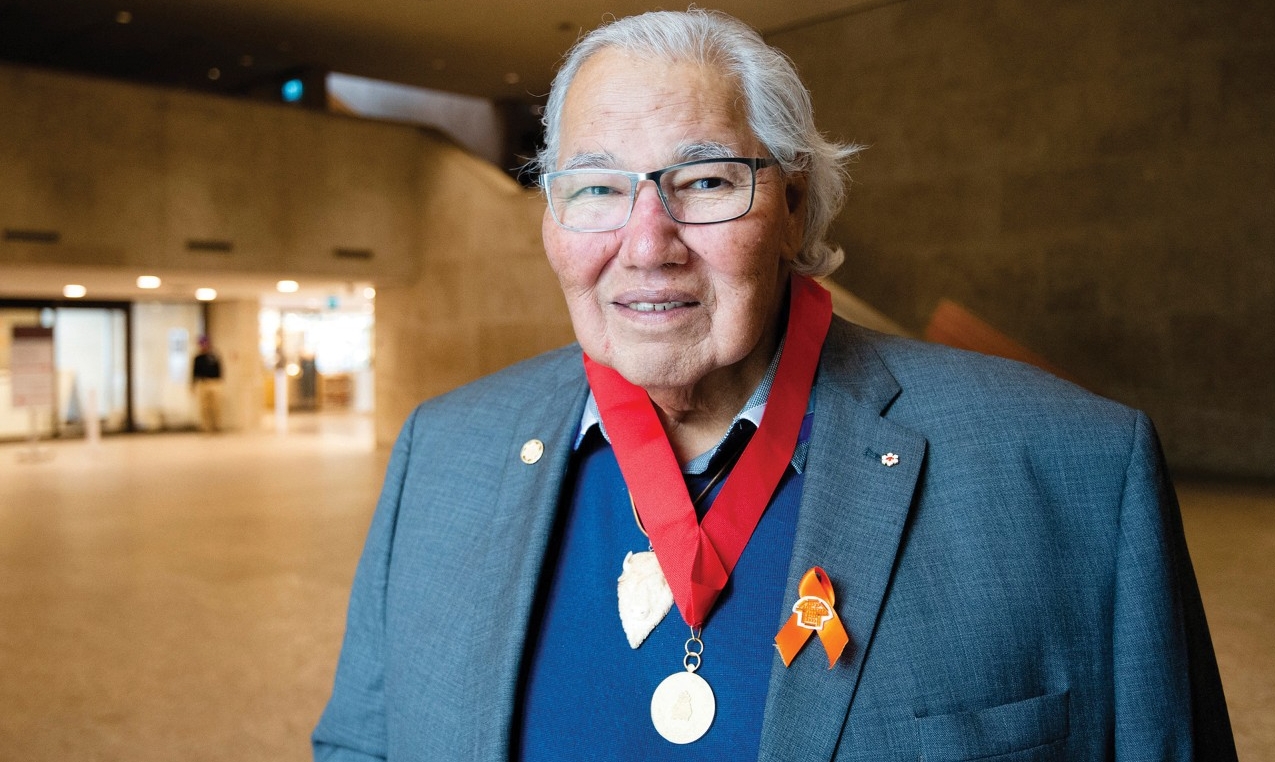Murray Sinclair (1951 – 2024): Lifelong champion of Indigenous rights
 In 2022, Concordia awarded Murray Sinclair the Loyola Medal, the university’s highest non-academic honour for significant contributions to Canadian society.
In 2022, Concordia awarded Murray Sinclair the Loyola Medal, the university’s highest non-academic honour for significant contributions to Canadian society.
The Honourable Murray Sinclair — former senator, judge and chair of Canada’s Truth and Reconciliation Commission (TRC) — passed away on November 4, 2024. He was 73.
“Justice Sinclair was a tireless advocate for truth and justice, devoting his life to the service of others,” says Concordia President Graham Carr, who presented Sinclair with the university’s Loyola Medal in 2022.
“Through his important work with the TRC, he challenged all Canadians, including those of us in the university sector, to learn our nation’s shameful history of oppression and violence against Indigenous peoples. We should be eternally grateful for his leadership and resolve, and for sparking the movement toward healing and reconciliation.”
A life of service
Sinclair was born in Selkirk, Manitoba, in 1951. After his mother died of a stroke when he was an infant, he and his two siblings were raised by their grandparents. A promising student, Sinclair was valedictorian of his graduating class and named Athlete of the Year at Selkirk Collegiate.
In the late 1960s, Sinclair enrolled in the University of Manitoba’s physical education program, but dropped out in 1969 to care for his grandmother after his grandfather died. He moved in with her and found a job as a social worker and administrator at the Friendship Centre in Selkirk.
At the centre, Sinclair met many families who needed social services and housing support, and he would often call his local member of the legislative assembly (MLA) for support with more urgent cases.
That MLA, Howard Pawley, an influential young lawyer who would later become premier of the province, encouraged him to apply to law school. In 1976, Sinclair was accepted into the Faculty of Law at the University of Manitoba, after completing an undergraduate degree in sociology and history at the University of Winnipeg.
Sinclair graduated from law school in 1979 and began practicing in 1980, focusing on civil and criminal litigation, Indigenous law and human rights. In one of his first cases, a judge mistook him for the defendant, further reinforcing his commitment to practicing law.
In 1988, he was appointed associate chief judge of the Manitoba Provincial Court, becoming the province’s first, and Canada’s second, Indigenous judge. Sinclair was soon made co-commissioner of Manitoba’s Aboriginal Justice Inquiry, an investigation into the presence of systemic racism in the province’s criminal justice system.
Space for collective healing
In 2009, Sinclair was appointed chair of Canada’s Truth and Reconciliation Commission, investigating the experiences of Indigenous children sent to residential schools. He participated in hundreds of hearings across Canada, ensuring that survivors’ stories were properly documented so all Canadians could learn about this dark chapter of history. The TRC’s influential report, published in 2015, included 94 recommendations for Indigenous and non-Indigenous Canadians to begin their collective journey toward reconciliation.
Sinclair was appointed to the Senate of Canada in 2016, retiring in 2021 to mentor young Indigenous lawyers and write his memoirs. He became chancellor of Queen’s University later that year.
The recipient of numerous awards, Sinclair received Canada’s Meritorious Service Cross in 2015 and was named Companion of the Order of Canada in 2021.
In 2022, Concordia awarded Sinclair the Loyola Medal, the university’s highest non-academic honour for significant contributions to Canadian society. Following the ceremony, students and alumni around the world tuned in to watch Sinclair’s inspirational public address online.
“Through his unwavering determination to uncover the truth, he lifted our lived experiences out of obscurity and shed a blinding light on oppressive assimilation policies that ruined the lives of so many Indigenous people,” says Manon Tremblay, BA 03, Concordia’s senior director of Indigenous Directions.
“His work has made us all reflect on how to move forward in a good way, through the building of mutually respectful relationships that celebrate First Nations, Métis and Inuit contributions to Canadian society. All Canadians owe him a debt of gratitude.”
Sinclair was predeceased by his wife Katherine Morriseau-Sinclair and leaves to mourn five children and three grandchildren.